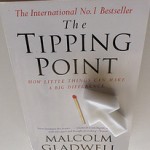What Makes a True Thought Leader?
 Thought leadership is a big buzz term in the big biz world these days. Everyone seems to want to be a “thought leader.” And just about every major consulting company–small and large–wants to tell you how you can transform yourself into one.
Thought leadership is a big buzz term in the big biz world these days. Everyone seems to want to be a “thought leader.” And just about every major consulting company–small and large–wants to tell you how you can transform yourself into one.
But what makes a true thought leader? Are you a thought leader if you give info and advice? What if you publish a book or do lots of speeches? Do you have to have a column in The Wall Street Journal or give a keynote at the World Economic Forum?
I think a thought leader is someone who has something worthwhile to say. And a sizeable audience that wants to listen. No matter what a marketing consultant tells you, you can’t transform yourself into one overnight.
Having a well published book is often seen as the sine qua non of your rise. Some people think that once they have it they will step through a door and become a highly-paid keynoter or go-to media source. These are potential opportunities, no doubt; what surprises some authors however is the new, heightened level of competition they face with other established speakers and experts. The future thought leader controls a critical variable in this process — the quality and rigor of their content.
In my career I’ve had the chance to edit and promote many exceptional folks considered thought leaders in management, public policy, science, and global strategy. I’ve noticed these people share some core traits. They work tirelessly to forge insight, experience, passion, and research into documents and public statements that other leaders truly pay attention to. They test their conclusions and methods with peers, colleagues, and wider audiences. They pay attention to the published work in their field. They debate and welcome debate. Yes, “thought leadership” has many benefits, but it begins with the long careful work of creating impeccable content of high quality. In short, true thought leaders don’t go out with their ideas until they are fully prepared.
* Consider these early steps to test (and improve) your readiness for rolling out your big ideas to a national or global audience:
* Be willing to revise, retry, and retest:Share your book idea, white paper, innovative strategy or killer app with informal peer groups;
* Ask colleagues or associates to read your big document and give you a written, objective review–consider paying a fee to encourage a thorough response;
* Create an informal focus group and have them fill out a short survey designed to draw out their views of strengths and weaknesses;
* Accept speaking invitations, local media interviews and appearances to get comfortable with and practice messaging your key points;
* Submit articles to professional, online, and local publications where barrier to publication is lower, and seek reader responses.
To spread your ideas, ensure they have the strength to make the journey. More on this to come.




